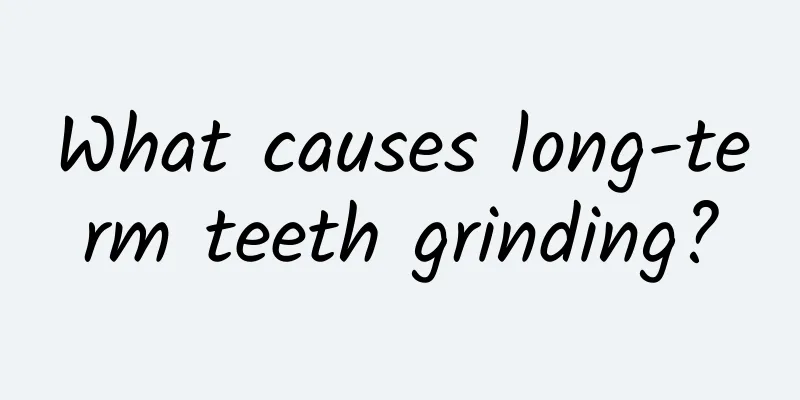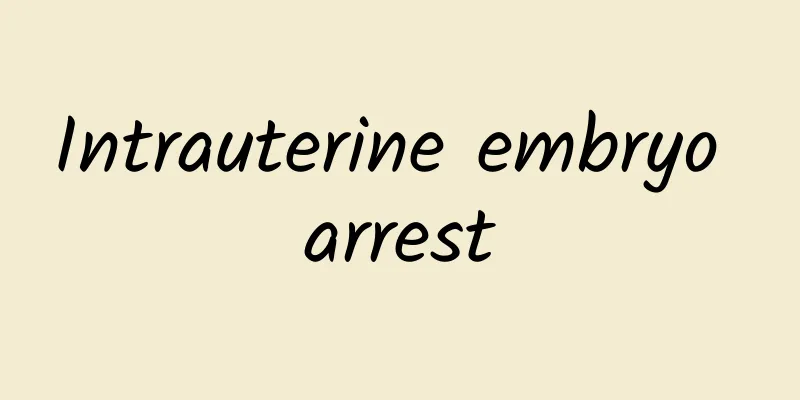What causes long-term teeth grinding?

|
Teeth grinding not only disturbs other people's rest, but also causes wear and tear on the teeth of the person who grinds his teeth, and his periodontal tissues and mandibular joints will also be harmed to a certain extent. So what are the causes of teeth grinding? 1. Gastrointestinal bloating Eating too many snacks or excessive appetite before going to bed, or eating too much at dinner, will cause the gastrointestinal tract to feel bloated at night, which can cause phenomena such as teeth grinding and talking in sleep. 2. Decreased gastrointestinal digestive function If the gastrointestinal function declines, the lactic acid metabolites in the body cannot be processed and excreted in time and accumulate in the body, causing the body muscles to contract tensely and irregularly. The mandibular joint motor muscles are the most sensitive, and symptoms such as teeth grinding and restless sleep will occur at night. 3: Parasites When parasites breed in the intestines, they secrete a toxin that irritates the intestinal wall and affects the function of the digestive system, causing symptoms of teeth grinding when sleeping at night. 4. Dental diseases Due to the obstruction of tooth occlusion, people will unconsciously increase the grinding of teeth when sleeping at night to remove the obstruction. When teeth have abnormal diseases such as tooth decay, periodontal disease, and swollen gums, it can also cause oral discomfort. The most direct manifestation is the symptom of teeth grinding at night. 5. Lack of energy Daily mental stress and increased pressure will increase the tension of the mandibular muscles under the influence of mental stress. The trigeminal nerve that controls the masseter muscle at night will gradually weaken during sleep and lose its control function, causing involuntary movement of the masseter muscle and resulting in bruxism. 6: Other factors Nutritional deficiencies, blood sugar and calcium concentrations, endocrine disorders, etc. may all be contributing factors to bruxism. In addition, uric acid hyperplasia, hyperthyroidism, allergies, irritable bladder syndrome, etc. may also cause bruxism. Although nocturnal bruxism may not cause any temporary pain, it may cause severe wear of the occlusal and adjacent surfaces of the teeth in the long run, and may lead to various complications. Intractable bruxism can lead to destruction of periodontal tissues, loose or displaced teeth, gum recession, and loss of alveolar bone. It can also cause abnormal chewing function, such as hyperfunction of the chewing muscles, spasm, fatigue, pain, etc. |
<<: Causes and treatments of bumps at the base of the tongue
>>: Aphrodisiac and kidney-tonifying recipes make men "vigorous and energetic"
Recommend
Yellow spots in the eyes
Under normal circumstances, the eyes are composed...
The main reason for the baby's lymph nodes
It is quite common for babies to have lymph nodes...
Causes of chest tightness, dry cough and shortness of breath
If we want to treat chest tightness, dry cough an...
Left side headache throbbing
If the left half of the head is throbbing with pa...
What are the benefits of scraping and cupping
Scraping and cupping are commonly used treatment ...
What causes red eye bags?
You may often have red eye bags in your life. Sta...
What are the symptoms of weak spleen and stomach? How to maintain healthy spleen and stomach for children?
Many children with weak spleen and stomach suffer...
Oral blood circulation and anti-inflammatory medicine for ankle sprain
The ankle is a very important part of our leg str...
What to do with herpes on the face? Chinese medicine recommends dietary remedies
If we do not pay attention to facial cleansing on...
What should I do if I vomit after drinking? 5 tips to easily solve vomiting after drinking
Many people have experienced being drunk. Common ...
Can I get pregnant when I'm approaching menopause?
Female friends have not yet fully entered menopau...
X-ray manifestations of bone hyperplasia
In fact, bone hyperplasia is an arthritis disease...
What to do if you have a sore throat during pregnancy
Many pregnant women often experience sore throat ...
Where to apply moxibustion on hand numbness
Numbness in the hands is common among many middle...
Suddenly woke up when falling asleep
I believe many people have had this experience: w...









